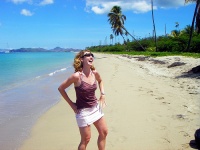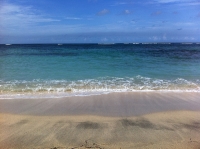Nevis Travel Guide
A pearl hidden in the Caribbean, Christopher Columbus named Nevis from his first sighting of the island in 1493. The island's cloud-capped volcanic peak reminded him of snow, which is called in Spanish.
Small and round, Nevis is only about seven miles (11km) long and five miles (8km) wide. It's an unspoilt and serene island that's a delight for nature-lovers and those seeking an escape from the modern world.
Its single volcanic peak rises 3,232ft (985m) above verdant rainforest filled with tropical flowers and animals, and the beaches and clear waters that surround the island provide the ideal holiday environment for swimming, sunbathing, and underwater exploration.
During the 18th century Nevis gained wealth from its sugar industry and became known as the Queen of the Caribbean sugar islands. Its social life became as decadent as it was extravagant. Today, grand estate houses and once lavish hotels lie in ruins and sugar plantations remain untouched since the decline of the once coveted trade.
The charm of its small towns, the genuine hospitality and friendliness of the people, and the laws controlling over-development and natural conservation attracts visitors today. Lavish manors have been preserved and rank among the best plantation inns in the Caribbean, and architectural gems and historical relics promise hours of exploration amid the natural splendour that covers the island.
Today, Nevis has a reputation for elegant living, with one of the world's most exclusive resorts and spas, golf courses, a variety of restaurants and bars, and beautiful gardens and beaches. A vacation in Nevis is sure to recharge any traveller's batteries.
Things to do in Nevis
With very little commercial development and resorts, Nevis is attractive to travellers because it remains a sleepy and unspoilt Caribbean island. Hikers follow trails to a number of scenic views, pristine waterfalls, jungle ravines, and long stretches of beach. A climb up volcanic Mount Nevis takes about four hours.
Those wanting to experience the wealth of local flora without exhausting themselves can simply visit the Nevis Botanical Garden, which is one of the island's most popular attractions and features hundreds of exotic tropical plants, both indigenous and from further afield.
Visitors interested in the plantation culture of yore will see old ruins dotted all over the island. Two of the best places to see the remains of historic buildings are the Montpelier Plantation Inn, once the site of Montpelier House, where Horatio Nelson married Frances Nisbet in 1787, and the New River Estate, which was the last sugar mill to shut down on the island, remaining operational until 1958.
The capital of Charlestown is devoid of fast food chains and boasts some historic remnants of colonialism. Despite the scattered Edwardian buildings and old churches, not much sightseeing is really possible in Charlestown. Yet Hamilton House, housing the Museum of Nevis, is worth a visit.

Pinney’s Beach
Pinney's Beach is one of the best beaches in the Caribbean. The epitome of paradise, its fine white sands are backed by palm trees and lapped by calm Caribbean waters. Lying within convenient distance of Charlestown, Pinney's Beach has a few casual restaurants and beach bars, and is the closest thing Nevis has to a party beach, although the length of the beach ensures that a secluded spot can always be found. The four-mile (6km) stretch of sand is never crowded and entertains a beautiful lagoon, with ideal conditions for swimming. However, Pinney's Beach is not ideal for scuba diving and snorkelling as the water can be quite murky.

Oualie Beach
Oualie (pronounced wah-lee), meaning 'beautiful waters', was the original name of the island of Nevis, and the pretty stretch of sand known as Oualie Beach lives up to its name. Located on the northern shore of the island, Oualie Beach boasts fine yellow sand and sheltered waters that are ideal for swimming. The area also makes a good base for a holiday on the island of Nevis, with the excellent Oualie Beach Resort providing top-class accommodation in the picturesque bay. Oualie Beach is home to fun activities, with water taxis, scuba diving, snorkelling, fishing, mountain biking, and windsurfing easily organised from its pleasant dock area.
St Kitts and Nevis travel info
Electricity
Electrical current is 230 volts, 60 Hz, but a 117-volt supply is available in most hotels. Round three-pin plugs and three-pin rectangular blade plugs (as in the UK) are in use.
Language
English is the official language.
Money
The official currency is the East Caribbean Dollar (XCD), which is divided into 100 cents. It is tied to the US dollar at a rate of US$1 to XDC2.70. Most businesses accept US dollar notes as payment, but change is given in XCD. Major credit cards are widely accepted, and major currencies can be exchanged at banks, with US dollars the cheapest to exchange. Most banks are closed on weekends, but provide 24-hour ATM services.
Tipping
A 10 percent service charge is usually included in hotel and restaurant bills. Otherwise, it's customary to leave 10 to 15 percent of the bill, depending on the service. Taxi drivers can also receive a tip of around 10 to 15 percent.
Health
All eligible travellers should be up to date with their COVID-19 vaccines, and vaccinations for hepatitis A, hepatitis B and typhoid are recommended. A yellow fever vaccination is required for travellers who are over the age of one and are visiting from a country where there is a risk of transmission. Dengue fever can occur throughout the year and cases of Chikungunya virus have been reported, so visitors should take steps to avoid being bitten by mosquitoes. The main government hospital can cope with many types of treatment but serious cases may require emergency evacuation. Medical treatment can be expensive; visitors should have adequate travel health insurance and accessible funds to cover the cost of any medical treatment and repatriation.
Safety
Although most visits to the islands are trouble-free, visitors should still guard against robbery and other crimes of opportunity. Valuables should be left in hotel safes where possible and remote places, particularly beaches, should be avoided, especially after dark. Travellers should take great care at all times when swimming as currents can be deceptively strong and not all beaches have lifeguards or warning flags. Hurricane season normally runs from June to November.
Local customs
Local attitudes towards the LGBT community are mostly conservative throughout the Caribbean. Public displays of affection such as hand-holding or kissing between same-sex couples are uncommon; certain homosexual acts are illegal. Wearing camouflage clothing is illegal and the penalties for drug-related offenses are severe.
Doing business
Business in Saint Kitts and Nevis is conducted in a relatively informal manner, but fairly formal dress is expected despite the heat. Handshakes for both men and women are the common form of greeting, and business cards should be exchanged immediately after being introduced. Business hours are generally 8am to 4pm Monday to Friday, with an hour taken at lunch.
Duty free
Travellers over the age of 18 may import 200 cigarettes or 50 cigars or 250g tobacco, and 1.5 litres of wine or spirits without paying customs duty.
Communications
The international dialling code for St Kitts and Nevis is +1 869. Hotels, cafes and restaurants offer free WiFi; travellers can purchase local prepaid SIM cards for unlocked phones.
Passport & Visa
Although a maximum stay of either three or six months is indicated in official requirements, immigration officials will decide how long visitors are legally allowed to stay in St Kitts and Nevis upon arrival. Visitors are recommended to hold confirmed return or onward tickets, all documents needed for next destination and sufficient funds to cover their stay. As part of the Western Hemisphere Travel Initiative (WHTI), all travellers moving between the United States and Canada, Mexico, Bermuda, and the Caribbean region are required to present a passport or other valid travel document to enter or re-enter the United States. If departing from the USA a valid passport will be required by immigration authorities. It is highly recommended that travellers' passports have at least six months' validity remaining after the intended date of departure from their travel destination. Immigration officials often apply different rules to those stated by travel agents and official sources.
Entry requirements
U.S. citizens must have a valid U.S. passport to enter Saint Kitts and Nevis. No visa is required for stays up to 90 days if travellers have an onward or return ticket, confirmation of accommodation, and can produce evidence of their ability to maintain themselves.
UK passports should be valid for a minimum period of six months from the date travellers arrive. A visa is not required, though UK travellers will be granted a specific period to stay. Those who wish to stay longer must apply for an extension of stay through the St Kitts and Nevis Immigration Department.
Canadians require a passport valid for at least six months beyond period of stay. A visa is not required for a stay of up to six months.
Australians require a passport valid for at least six months beyond period of stay, but no visa is necessary for stays of up to three months.
South Africans require a passport valid for the intended period of stay, but no visa is required for visits of up to 90 days.
Irish nationals require a passport valid for the intended period of stay, but no visa is required for a stay of up to three months.
New Zealand nationals require a passport valid for the intended period of stay, but no visa is required for a stay of up to 90 days.
Useful contacts
Department of Tourism, Basseterre, St. Kitts: +1 869 465 4040 or www.stkittstourism.kn
Emergencies: 911Embassies / consulates in other countries
St Kitts and Nevis Embassy, Washington DC, United States: +1 202 686 2636.
St Kitts and Nevis High Commission, London, UK: +1 020 7937 9718.
High Commission for the Eastern Caribbean States, Ottawa, Ontario: +1 613 236 8952.
Embassies / consulates in St Kitts and Nevis
United States Embassy, Bridgetown, Barbados (also responsible for St Kitts-Nevis): +1 246 227 4000.
British High Commission, Bridgetown, Barbados (also responsible for St Kitts and Nevis): +1 246 430 7800.
Canadian High Commission, Bridgetown, Barbados (also responsible for St Kitts-Nevis): +1 246 429 3550.
Australian High Commission, Port of Spain, Trinidad and Tobago (also responsible for St Kitts-Nevis): +1 868 822 5450.
South African High Commission, Kingston, Jamaica (also responsible for St Kitts-Nevis): +1 876 620 4840.



